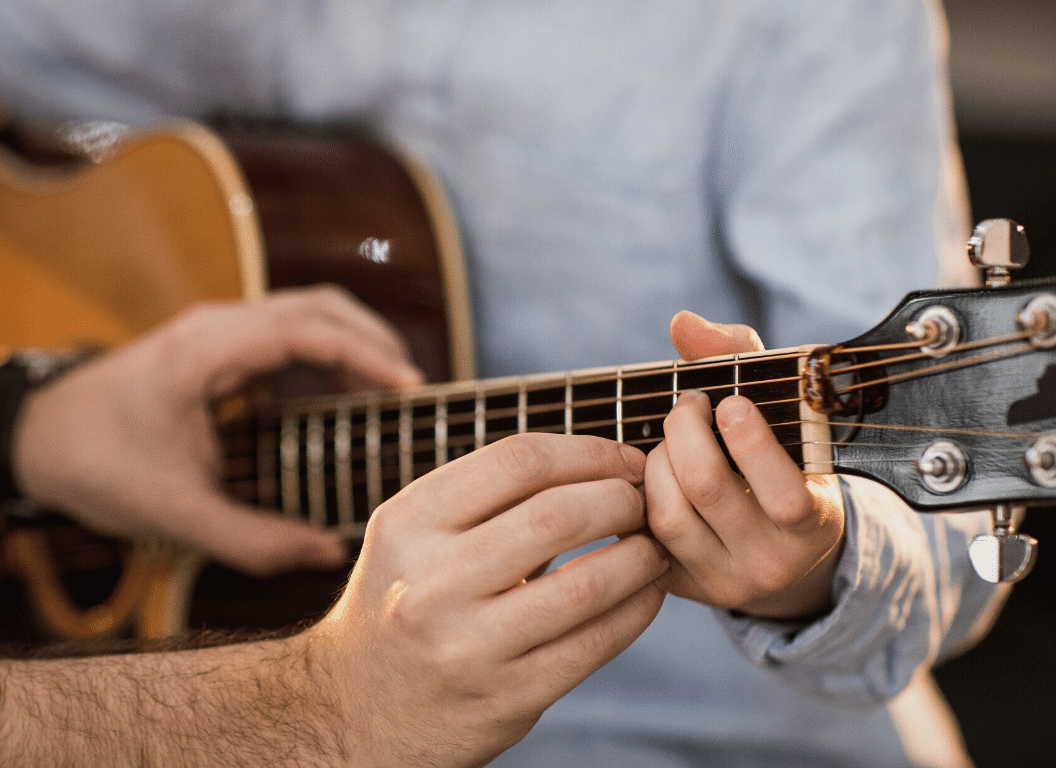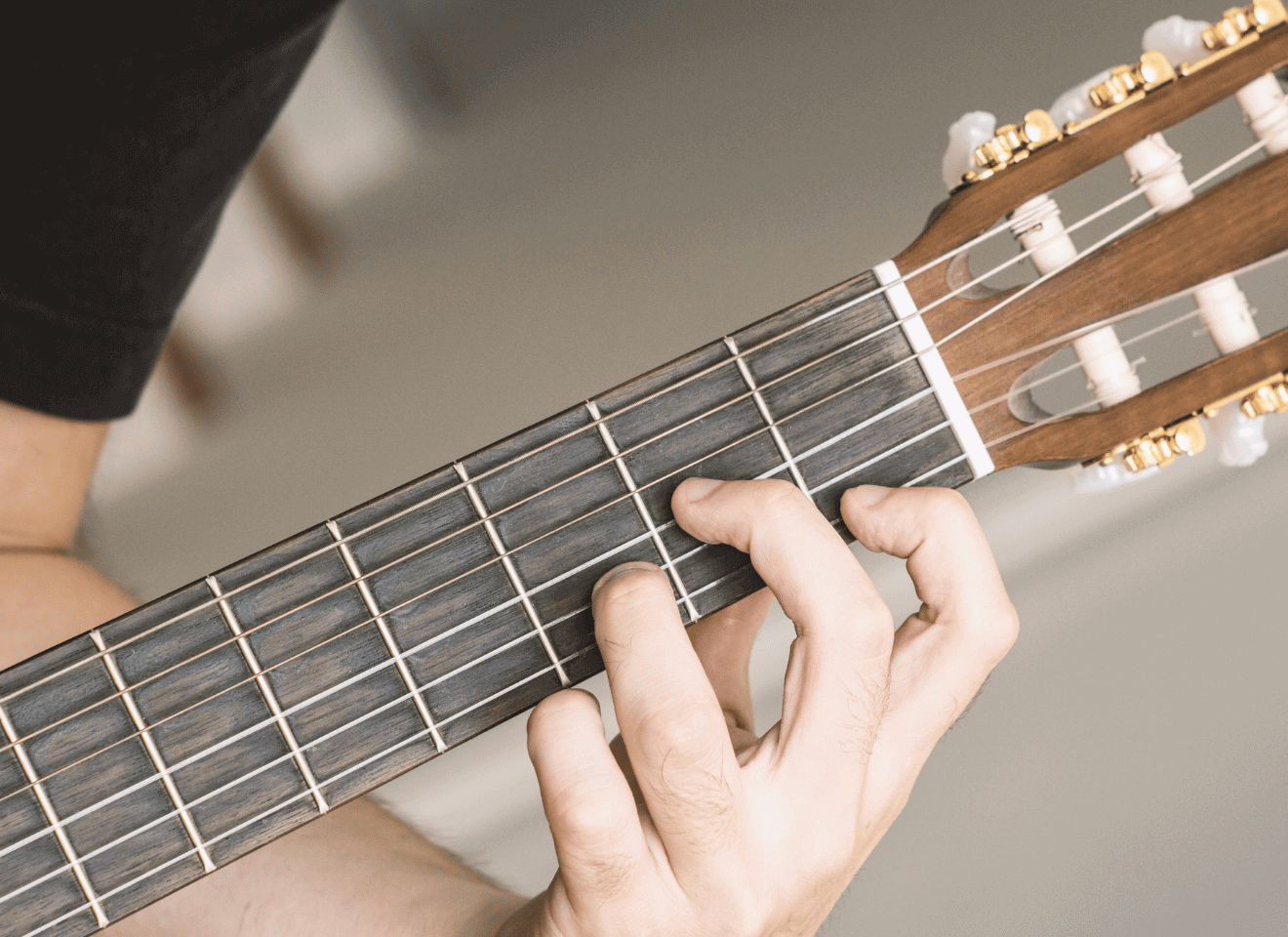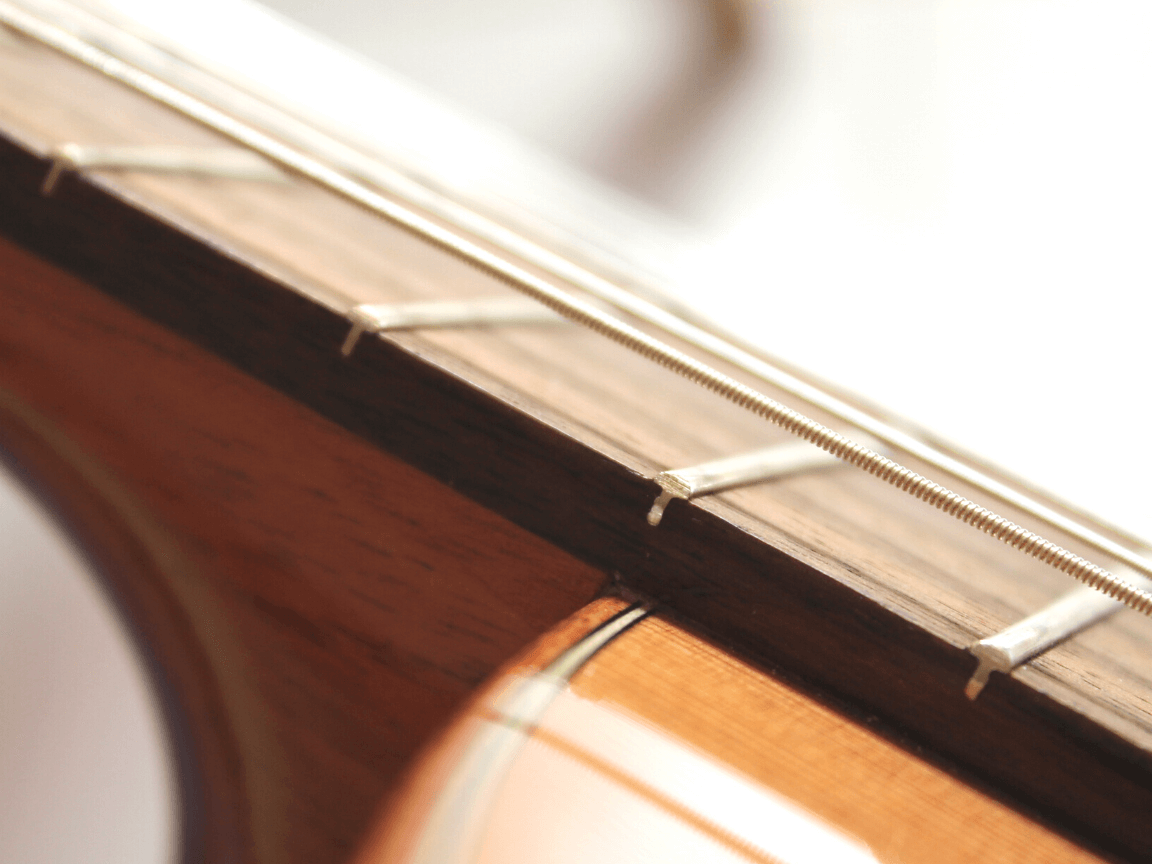The journey of learning a musical instrument often poses a key question that can shape the trajectory of the learner’s musical prowess and personal style.
For aspiring guitarists, the primary query involves the starting point: chords or scales?
Each approach offers unique benefits and challenges, influencing technical proficiency and musical understanding in different ways.
Regardless of the path chosen, dedication and consistent practice remain essential.
Analyzing the advantages and practical aspects of both methods can offer valuable insights for both teachers and students.
This post aims to illuminate these factors, providing informed guidance for beginners.
Table of Contents
- Should A Guitar Beginner Start With Chords Or Scales?
- Overview of Guitar Scales for Beginners
- What Are Basic Guitar Chords?
- Key Advantages of Learning Scales First
- Benefits of Starting with Chords in Guitar
- How Do Scales Improve Your Guitar Skills?
- Role of Chords in Enhancing Guitar Playing Abilities
- Scales vs. Chords – Which is Easier to Learn?
- Ways to Practice Both Scales and Chords
- Tips for Progressing Your Guitar Skills
- The Bottom Line
Should A Guitar Beginner Start With Chords Or Scales?
A guitar beginner can start with either chords or scales, as both offer distinct benefits for learning. Chords aid in understanding harmony and allow beginners to play songs quickly, fostering motivation. On the other hand, studying scales helps in building finger strength, familiarization with the fretboard and provides a foundation for solo improvisation.
Delving deeper into this topic, it’s important to understand that learning guitar is not only about knowing chords or scales in isolation.
Integral aspects such as picking techniques, music theory, strumming patterns, ear training, and much more form an essential part of a structured guitar learning program.
By exploring these fundamental concepts – not only will you become a more skilled guitarist, but also gain a richer understanding of music as a whole.
Ahead, we will be discussing these in detail to ensure you’re not missing out any important step in your journey of mastering guitar.
Overview of Guitar Scales for Beginners
Learning to play the guitar isn’t merely strumming the strings.
It involves understanding various elements like scales and chords, and how they contribute to the melody and harmony of the music.
The term ‘scale’ in music, refers to a sequence of tones that move in a step-perfect order, also known as diatonic succession.
Guitar scales are the basis of all guitar playing techniques and come in various types and forms.
Importance of Guitar Scales
So, why should you learn guitar scales?
Well, firstly, they are the foundation of music.
Without a clear understanding of them, your ability to create or reproduce music is noticeably limited.
Scales help in finger training and dexterity, important skills for any beginner.
By practicing scales, your fingers learn to move smoothly and quickly across the frets, and your hand-eye coordination improves significantly.
Scales help in finger training and dexterity, important skills for any beginner.
That’s not all, scales enhance your sense of timing, rhythm, and speed, transforming you from a novice to an adept guitarist over time.
Moreover, they sharpen your understanding of music theory, helping you connect the dots between notes, chords, and melodies.
This is crucial in composing songs or even improvising well-known ones.
The Different Types of Scales
There’s a variety of scales that beginners can learn.
These include the Major scale, Minor scale, and Pentatonic scale.
The Major scale is the most basic scale, often referred to as do-re-mi-fa-so-la-ti in songwriting.
It’s cheery, bright, and forms the basis of numerous songs we love.
The Minor scale, on the other hand, is the go-to for creating a melancholic or contemplative mood and is often used in Blues, Rock and Metal genres.
The Major scale is the most basic scale, often referred to as do-re-mi-fa-so-la-ti in songwriting.
Lastly, the Pentatonic scale is a five-note scale (penta means five) often utilized in Blues and Pop music due to its simplicity and versatility.
Beyond these, there are others like the Chromatic scale and Blues scale that you can learn as you progress in your guitar playing journey.
For a practical approach to understanding and playing guitar scales, the above video tutorial is highly beneficial for beginners.
Through step-by-step guidance in the video, you will grasp how to muster the Major scale, the initial stepping stone towards the universe of guitar scales.
The Journey from Scales to Melodies and Solos
Once you get a hang of these scales, you’ll discover that these sequences of notes are not arbitrary.
They are, in fact, the building blocks of melodies and solos.
This implies, mastering scales gives you the liberty to venture into lead guitar playing —the forefront of every band—the one that garners the most ‘oohs’ and ‘aahs’.
Scales dictate the ‘acceptable’ notes that can be played in a song or composition, and hence, form the backbone of every melody or solo.
Therefore, having a good grip over them is crucial to your progress as a guitarist.
Learning Scales: A Step-by-Step Approach
The best way to get started with scales is by taking one scale at a time.
Begin with the Major scale as it will familiarize you with the basic format that most other scales are built upon.
Remember, practice is vital, and play each scale many times over at a slow and steady pace.
The aim here is not speed or proficiency, but familiarity and comfort.
Once you’ve done it enough times, you will see a notable improvement in your finger dexterity and overall playing.
Progress gradually to other scales once you are confident about the one you had been practising.
Consistency and patience are key, as with learning any other new skill.
Finally, don’t forget to incorporate your scales into real music!
Jamming to backing tracks, orchestrating melodies, or reproducing your favourite solos—all of this will not only reinforce what you’ve learned, but will also make the learning journey more enjoyable.
Remember, practice is vital, and play each scale many times over at a slow and steady pace.
Wrap up your learning session with a personalised cooldown routine, perhaps playing at a slower pace or returning to the simplest scale.
Remember, the aim is to relax and enable your fingers to wind down after a passionate session.
What Are Basic Guitar Chords?
Understanding guitar chords is a fundamental part of learning how to play the guitar.
In music, a chord is a group of notes played together, usually consisting of three or more pitches sounded simultaneously.
In the context of the guitar, a chord is a combination of notes produced when certain strings are strummed while others are held down by the fingers.
There’s a total of 12 major chords and 12 minor chords.
The simplest form of chords that beginners are introduced to are open chords, also known as first position chords.
These chords are commonly used in many songs, and they are a great starting point for any aspiring guitar player.
Major Chords
Major chords are defined by the major triad, which consists of the root (the first note), the major third, and the perfect fifth notes of a major scale.
Some of the basic major chords every beginner should study and practice include C Major, D Major, E Major, G Major, A Major.
These chords are bright, uplifting in tone and are commonly found in various genres of music.
The basic major chords every beginner should study and practice include C Major, D Major, E Major, G Major, A Major.
It’s important to understand that each of these chords has a unique pattern and finger position that needs to be memorized for effective play.
Regular practice can help in mastering these major chords effortlessly.
Minor Chords
In contrast, minor chords are composed of the root (first note), minor third, and perfect fifth notes of a minor scale.
The basic minor chords are more somber or melancholic in tone when compared to major chords.
Beginners should start with the basic A minor, D minor and E minor chords as they are simpler to learn and very common in music.
Getting a solid grasp on these are essential as they form the foundational understanding for more complex chords in the future.
Seventh Chords
Apart from major and minor chords, another chord type beginners should familiarize themselves with are seventh chords.
A seventh chord is a triad which has been extended to include the 7th.
The most common of these on the guitar are the Dominant 7th and the Major 7th.
The seventh chords pose somewhat of a challenge and marked as a landmark step in a beginners learning curve.
The most common of these on the guitar are the Dominant 7th and the Major 7th.
By learning and mastering major, minor, and seventh chords, a beginner can progress to playing a multitude of songs and expand their guitar playing abilities.
Another critical aspect for beginners is understanding the guitar’s fretboard and positioning fingers correctly on the frets.
Every chord shape has corresponding finger positions.
Proper finger positioning ensures clear, harmonious sounds when the guitar strings are strummed.
Understanding where each finger needs to be placed for each of the basic chords helps speed up transitions between chords and makes it easier to strum smoothly.
Above all, patience and consistent practice are the keys to mastering these chords.
Remember that forming chords can be a physically demanding task for the fingers, and it requires the flexibility that is developed over time.
Key Advantages of Learning Scales First
Among the first releases of the fretboard knowledge, learning scales can be pivotal in your journey as a beginner guitar player.
While there are multiple approaches to learning guitar, starting with scales has a number of significant benefits.
Fundamental Understanding of Music Theory
One of the biggest benefits of learning scales first is the understanding of music theory it provides.
You will grasp concepts such as pitch, intervals, and tonality.
This principled understanding will allow for a comprehensive approach towards the creation and reproduction of music on your guitar.
Learning scales can essentially be persuasive in shaping your musical foundation.
Fundamental music concepts such as pitch, intervals, and tonality are made easier to understand and apply in practical production when you begin with scales.
The more you understand the theory, the better you will be able to experiment with the sounds, leading to improved musicianship.
Thus, scales give beginners a solid footing in music theory, laying the groundwork for more advanced techniques.
Improved Dexterity and Finger Strength
Practicing scales consistently also promotes better dexterity and finger strength.
Playing scales involves routine repetition and this physical element of training your fingers to smoothly glide across the fretboard cannot be understated.
The more you practice, the more efficient your finger movements will become.
Practicing scales is not just about understanding music better, but also acclimatizing your fingers to strategize their movement across the fretboard.
This facilitation of better technique also leads to faster playing speed and smooth transitions between notes.
By building up your muscle memory through scales, you’re not only improving your playing technique but also paving the way for effortless performance.
Watching this video will offer further insight on how scales are important in learning the guitar.
You’ll understand from a professional perspective, the basic knowledge and the potential application of scales in enhancing beginners’ guitar skills.
Enhancement of Ear Training
Lastly, learning scales benefits help in ear training.
Every scale produces a distinctive sound, and by repetitively practicing scales, you’ll develop an ability to recognize these sounds.
Ear training can aid in playing songs by ear, improvisation and even writing your own music.
Learning scales gives you an understanding of the distinctive sounds each scale produces, helping you recognize these sounds and enhancing your ear training.
In essence, ear training enhanced by scales forms an essential step in becoming a well-rounded musician.
This is ultimately why many professionals regard learning scales first as a highly effective approach for beginner guitarists.
Benefits of Starting with Chords in Guitar
Many aspiring guitarists are often faced with a critical question: Is it better to start with learning scales or chords? While there is no absolute answer, it’s worth noting that starting with chords does bring about its suite of benefits.
A Quicker Way to Play Songs
One of the most compelling reasons to learn chords first is the immediate satisfaction of playing songs.
Chords form the backbone of most songs, and knowing how to strum them represents a fundamental skill in guitar playing.
This allows beginners to quickly dive into playing their favorite tunes, breeding a sense of accomplishment early on which can be vital for maintaining motivation.
With a few basic chords, such as G, C and D, you can already play thousands of popular songs!
According to many teachers and experienced players, getting off to a good start can positively impact the overall learning journey.
One of the most compelling reasons to learn chords first is the immediate satisfaction of playing songs.
This rewarding early success can give you a confidence boost that will encourage continuous learning and progress.
It is a clear evidence that you are capable and you have the potential of mastering more complex structures and techniques in future.
Exploring the Range of the Guitar
Chords inherently introduce the player to the entire fretboard.
Since chords utilize multiple strings and frets at once, they’re a great way to gain familiarity with the guitar’s layout.
Unlike scales that are often played on a single string, chords offer a more comprehensive approach to exploring the guitar’s range.
Your hands get acquainted with the varying string tension and different finger arrangements, paving the way for easier mastering of barre chords and scales in the future.
This exposure to the fretboard’s entirety enables learners to develop a much broader perspective in terms of technique and musicality.
Chords inherently introduce the player to the entire fretboard.
There’s a lot happening beneath the fingers when you play a chord, from the mix of tones and overtones to the feel of the different strings.
This makes chords a great gateway into the world of sound exploration, leading to an enriched understanding of what the guitar can really do.
Building Foundation for Further Learning
Chordal learning also serves as a solid foundation for the more advanced theories and techniques.
Playing chords involves both hand coordination and rhythm.
Mastering chords early helps beginners strengthen these two crucial skills, which are applicable and necessary across all guitar styles and genres.
Additionally, knowledge of chords helps in understanding music theory.
Chords are essentially built from scales.
Once you are competent with chord forms and progressions, learning and understanding scales, modes, and melody construction becomes much simpler.
Starting with chords can be a launching pad to a broader musical exploration.
As one gets comfortable with chords, it becomes easier to experiment and begin understanding the relationships between chords and scales, which is fundamental to improvisation and songwriting.
How Do Scales Improve Your Guitar Skills?
Learning and practicing guitar scales is an essential part of developing your guitar playing skills.
The benefits of learning scales range from increased finger strength and flexibility to an improved understanding of music theory.
One of the ways that practicing scales improves your guitar skills is by enhancing your finger flexibility and strength.
This physical development helps you perform complex fingerings and fast passages with more ease and accuracy.
Practicing scales can also lead to a better understanding of music theory.
As you learn more scales, you will begin to see patterns and relationships among notes that can help you understand how music is composed.
Familiarity with scales can greatly improve your ability to improvise and solo during a performance.
When you know your scales and the melodies and harmonies they can create, you have the freedom to explore and express your musical ideas more effectively.
Many guitar solos in popular music are based on scales.
Another notable benefit of practicing scales is the increase in finger speed and precision.
As you practice scales, your fingers learn to hit the correct frets at the right time, increasing your playing speed and reducing the likelihood of making mistakes.
Practicing scales is key to increase your finger speed and precision.
The repetitive nature of practicing scales helps build muscle memory, which is crucial to developing speed and accuracy.
Muscle memory allows your fingers to automatically know where to go on the fretboard, making you a more efficient player.
Practicing scales can also enhance your understanding of key signatures and chord progressions.
Each scale corresponds to a key signature, and knowing these can help you understand and predict chord progressions in a piece of music.
Understanding of key signatures and chord progressions is another benefit of practicing scales.
This understanding is critical for composing your own music, as well as for playing along with other musicians.
The more scales you learn, the more key signatures and chord progressions you will be familiar with, giving you a wider range of music that you can play.
Role of Chords in Enhancing Guitar Playing Abilities
Understanding and mastering chords is crucial in enhancing one’s guitar playing abilities.
The formation and strumming of chords provide the backbone for most songs and are vital in cultivating strong, sophisticated musical skills.
It’s important to remember that chords are not just the basic building blocks of music but also an essential component to expressing oneself through the instrument.
Swift Development of Musicality
Initially, learning and mastering chords can be a challenge.
However, with frequent practice, muscle memory aids in the swift development of finger positioning, enabling smoother transition between chords.
This is key in playing songs smoothly and flawlessly on your guitar.
The ability to play songs is an important stage in boosting one’s musicality.
This stage is significant as it not only <enhances your guitar playing abilities but it also helps in increasing the enjoyment and satisfaction of playing.
It sparks an interest in exploring different musical genres and styles, expanding your overall musical knowledge and understanding.
Improved Rhythm Skills
Strumming chords in different strumming patterns significantly improves your rhythm skills.
A good sense of rhythm is indispensable in music as it provides the groundwork for playing in tune with other musicians or even just jamming along with your favorite songs.
It is also worth mentioning that strumming gives you the opportunity to explore various styles and genres of music.
Thus, this flexibility makes chord knowledge a versatile tool in a musician’s goal of enhancing playing abilities.
Boosted Confidence and Performance
Mastering chords not only promises technical skills but also breathes confidence in players.
With this confidence, you’re well on your way to performing and even creating your own music.
Chords allow guitarists the freedom of expression which can lead to increased satisfaction and continued interest in the instrument.
Performing songs smoothly improves your performance abilities and compatibility with other musicians, and by performing in front of others, you’re able to test your skills and apply what you’ve learned in a real situation with audience feedback.
With chords, enhancing guitar playing abilities becomes an attainable goal.
The Continuous Journey of Learning
In the realm of music, continuous learning is the key.
With dozens of different chords and chord variations, there will always be new ones to learn.
By simply exploring these avenues, guitarists can ensure their progression and continually push their skillsets forward.
Ultimately, understanding and mastering chords is fundamental to enhancing guitar abilities.
They lay the foundation for the development of musicality, rhythm, confidence, performance, and continuous learning, thus proving that the role of chords in improving guitar playing abilities is nothing short of essential.
Scales vs. Chords – Which is Easier to Learn?
As a beginner in guitar playing, you might find yourself torn between starting with scales or chords. This section aims to help you understand which might be easier for you to start with and why.
Learning Difficulty
When it comes to ease of learning, many musicians cite that scales could be simpler to start with.
The reason behind this assertion is that scales, especially the pentatonic scale, involve patterns that repeat across the guitar neck.
That makes them slightly easier to memorize.
The reason behind the assertion that scales could be simpler to start with is due to the repeating patterns across the guitar neck.
Chords, on the other hand, require you to simultaneously press down on multiple strings in different positions, which can be challenging for a beginner.
However, this doesn’t mean that mastering chords is impossible or even overly difficult for a beginner.
If learning chords seems overwhelming at first, this video might be particularly helpful.
It breaks down how to understand and play guitar chords using scales, making the whole process easier to grasp.
Time Factor in Learning
Regarding how long it takes to learn scales vs.
chords, there’s no definitive answer as it can depend on various factors.
These factors can include your learning speed, the amount of practice you put in, and your previous experience (if any) in playing an instrument.
In general terms, you might find that you can play a simple scale fluidly faster than mastering a chord.
In very general terms, you might find that you can play a simple scale fluidly faster than mastering a chord.
However, do remember that being able to play a scale or a chord quickly doesn’t necessarily mean you’ve ‘mastered’ it.
True mastery involves understanding when and how to use them in creating music.
Adaptability to Different Music Styles
Another consideration when choosing between scales and chords to start with is the music style you’re interested in.
Rock and blues, for instance, lean heavily on the use of scales, while folk music relies more on chords.
Rock and blues lean heavily on the use of scales, while folk music relies more on chords.
While this doesn’t mean that you choose only one, it might inform your decision about where to start.
Remember, the end goal is to be versatile in your guitar playing abilities.
In conclusion, scales might be easier for some beginners to learn due to their repetitive patterns, but chords also have their advantages.
Whatever you choose to start with, consistency, and practice are crucial to your progress.
Ways to Practice Both Scales and Chords
Practicing scales and chords on the guitar involves a combination of exercises and techniques designed to strengthen finger dexterity, improve knowledge of the fretboard, and enhance musicality.
It is important for every beginner to understand that both elements are vital in developing good guitar skills.
Using Warm-Up Exercises
One effective way of practicing both scales and chords is by incorporating them into your warm-up routine.
Trying to play through a scale or chord sequence can be a great way to get your fingers moving.
It can also enhance your familiarity with different notes and chord shapes on the fretboard.
Incorporating scales and chords into your warm-up routine will not only enhance your familiarity with the fretboard but also improve your finger dexterity.
This practice is beneficial because it ensures that you are engaging all your fingers in the exercise, hence, building strength and dexterity.
In addition, it kick starts your understanding of how to maneuver your fingers on the fretboard in order to play both chords and scales.
Practicing Scales and Chords Sequentially
Practicing scales and chords sequentially is another effective technique in mastering both music elements.
This practice involves moving through all the chord shapes or scale shapes systematically.
For instance, you could start with the C major scale, followed by the D major scale, and so on.
Similarly, you could practice all the major chords before moving to the minor chords.
Practicing scales and chords sequentially allows you to understand how each note or chord is connected to the next, ultimately improving your fretboard navigation skills.
This sequential practice fires up your creative cells, challenging you to think critically about the fingering patterns for each scale or chord.
The best part is that this practice is bound to enhance your fretboard navigation skills because you become more familiar with how different notes and chords are patterned on the fretboard.
Employing the Use of Metronomes
A metronome is a device used to keep a steady tempo.
It is a useful tool when practicing scales and chords because it helps maintain a steady rhythm.
Starting at a slow tempo, you can practice playing the scales and chords in rhythm with the metronome.
As you become more comfortable, gradually increase the tempo.
Using a metronome when practicing scales and chords is a wonderful way to improve your timing and syncopation.
Playing in time with a metronome will help you keep a steady rhythm, hence, improving your timing.
Eventually, you become accustomed to playing in sync with the rhythm, a skill that will be essential during your performances.
Applying Scales and Chords in Song Learning
Applying scales and chords in song learning is an excellent practical approach in simultaneously practicing these two aspects.
This involves identifying the chords and the scales that have been used in a particular song.
Then you practice playing those identified chords and scales on your guitar.
Applying scales and chords in song learning offers an enjoyable and hands-on way to enhance your understanding and knowledge of these two components.
By doing so, you get to understand how these scales and chords are applied in an actual musical context.
It is also a fun and enjoyable way to practice scales and chords, which enhances your learning experience.
Tips for Progressing Your Guitar Skills
Developing proficiency in playing the guitar requires consistent practice, correct techniques, and a dedicated mindset.
Every guitarist, be it a beginner or at an advanced level, can always benefit from tips and tricks that can fast-track their progress.
Whether you’re practising scales or chords, the following information will provide useful tips to enhance your skills.
Focused and Consistent Practice
Focused and regular practice is undeniably one of the most important factors in enhancing your guitar skills.
Instead of practising for long hours sporadically, intense and regular shorter practice sessions can bring about a remarkable improvement in a short period.
Remember, it is essential to practice daily, as regular repetitive motions help to build muscle memory, making guitar playing feel more natural.
The quality of your practice is more important than the quantity.
Intense and regular shorter practice sessions can bring about a remarkable improvement in a short period.
This valuable recommendation becomes even more significant when you consider that lengthy, unfocused practice sessions can instigate sloppy technique and, worst of all, lead to any bad habits becoming ingrained.
Learning Music Theory
To truly excel in playing the guitar, learning music theory is crucial.
The theory gives you a deeper understanding of how music works on a structural level, helping you to grasp concepts such as scales, chords, and progressions.
Learning music theory not only makes you a better guitar player but also makes learning new songs much easier.
Understanding the theoretical aspects equips you with the language and mental tools
you need to compose and analyze music.
It enhances your ability to communicate effectively with other musicians and can grant you confidence while improvising or writing your own music.
Exploring Different Genres
Playing different genres can stimulate your creativity, challenge your skills, and broaden your musical horizons.
Each genre has unique characteristics, techniques, and chord progressions that can add versatility to your playing abilities.
Watching this video will provide you with practical tips and exercises to improve your guitar skills faster.
These strategies are applicable to guitar players of all levels and designed to optimize your practice sessions and accelerate your learning curve.
Playing Along With Others or Recordings
When you play along with others or recordings, it offers a unique learning experience that playing alone cannot replicate.
It can help you understand different rhythmic patterns, make you attentive to timing, and introduce you to a wide variety of playing styles.
This approach also gives an opportunity to play in a different range, and adapt to the dynamics of playing in sync with other instruments.
Playing along with others or recordings offers a unique learning experience that playing alone cannot replicate.
Not only does this help improve your technical abilities, but it also increases appreciation, understanding, and love for music.
This collaborative approach fosters creativity and offers invaluable experience, similar to playing live or in a band.
The Bottom Line
After exploring the importance, differences, and advantages of both guitar scales and chords, it is evident that they both play a crucial role in honing one’s guitar-playing abilities.
Although the learning journey might vary for each individual, mastering both aspects can ultimately boost your competency and versatility as a guitarist.
They each offer unique benefits – scales enhance soloing skills and fretboard understanding while chords improve rhythm and harmony.
There isn’t a quick and universal answer to which is easier to learn, as it more often depends on the learner’s dedication, practice, and passion.
Thus, it is recommended for beginners to weave in both chords and scales into their routine practice as a balanced approach to effectively progress their guitar skills.
Ultimately, the length of time in learning these depends on your individual practice, patience, and persistence.

Dad, husband, son, and guitarist. I’ve been playing guitar for 20 years. Passion for writing, painting, and photography. I love exploring nature, and spending time with my family. Currently have a Gretsch G5220 Electric Guitar as my main instrument.




